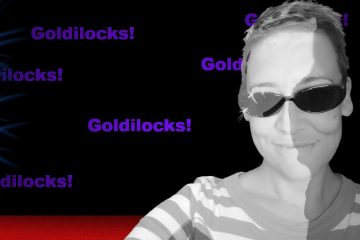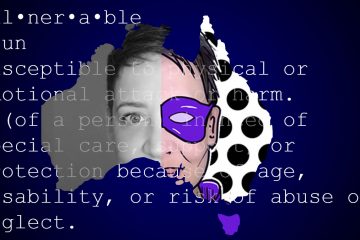In the BrainAblaze podcast ‘Sleep Till Brooklyn’, host, David Clifford, described just how important sleep is, and, more specifically, how vital it is for people with epilepsy. It had already inspired my post this week, and then, in a (harsh but timely) turn of fate, I had a fall. ‘What exactly has this got to do with sleep, Goldilocks?’ I hear you cry. Well, if you wait for just a paragraph, all will become clear (promise).
I think we know each other well enough now that I don’t have to tell you it was Epilepsy Goldilocks up to old-and-truly-tiresome-tricks, and it was a doozy. I fell on my face in the kitchen, which is not unusual. However, this time I spilt breakfast cereal. And in real, Alanis-Morissette-level irony, it wasn’t the Coco-Pops (no, not the Muesli), but porridge oats. Yes, ladies and gentlemen: Epilepsy Goldilocks dropped the porridge. This injury bruised my ribs and, as soon as it’s not excruciating to do so, I’m sure I’ll find it funny and even laugh.
It’s here where my post slides Tetris-like into the ‘Sleep Till Brooklyn’ podcast. Anyone who has ever broken, cracked or bruised a rib will tell you that it makes doing anything (and I mean anything) painful. Sleep became an issue. I sleep on my front, and finding a comfortable position in which to fall asleep has been somewhat tricky. The first night I struggled through. The second night, Saturday night, was unbearable.
OMG, It’s Early!
The evening had been relatively ‘normal’: I’d brushed my teeth; I’d swallowed the mountain of pills that is my medication, and I’d climbed into bed. Eventually, I managed to fall asleep, thanks to painkillers, yet I awoke at 2.45am, and my heart was pounding. I’m pretty confident I had a nocturnal seizure (but there’s no way to know this for sure).
I woke up at OMG-it’s-early to find my head going around in a loop of panic. My entire body was gripped with the sensation that ‘something’ was wrong. It was as if my brain had latched onto the feeling that, if it allowed me to sleep, ‘bad’ things would happen. What’s worse is this isn’t the first time I’ve had this experience. After I stopped working entirely in February 2017, this would happen (pretty much) every night. It feels like I’m out of control, and continues for much of the following day. Although this time, there was one significant difference. I could give it a name: anxiety.
I’m not sitting here all tippety-tappety on the keyboard trying to sell you ‘if you can give it a name it’s not scary’ because as you know with fear, panic, or stress that’s just rubbish. (You might be afraid of spiders, and they’ve got names, right?) Yet, I am saying this time I knew what I was dealing with, and last time I thought I was going bonkers! What’s most frightening is, I hadn’t, to any extent, realised just how close to the surface my anxiety sits, which sucks because I thought I’d faced my fears. So, I need to start looking at what may have brought ‘stuff’ bubbling up. And there are no prizes for guessing what’s on top on the list.
Commencing Shut Down
In the last 10-days, I’ve had 2 seizure-related falls. I’ve thwacked my noggin to the extent that I had to cancel a haircut (it was too sore), and I’ve bruised a rib. While these injuries aren’t visible, they’ve taken their toll on me emotionally. The ‘Goldilocks Method’ talks about how the amygdala, the fight or flight centre of the brain, relies on anxiety to keep us safe; this is incredible information to have and is 100%-technically-correct-and accurate. Yet, at nearing 3am when I woke panicked (with no idea why) and my heart rate was 120bpm, having that data was useless.
(Entirely unhelpful.)
What I need is the ability to either: a) not wake up stressed out in the first place; or b) do something about it when it happens. Otherwise (as happened this weekend), I get stuck in a loop of stress, fatigue, seizure, fatigue, anxiety and so on. I rode it out through Sunday, taking deep breaths and reminding myself that I’d only had 3 hours sleep. It’s sleep (or more specifically, the lack of it) that significantly impacts my anxiety. And, in this, I’m not alone.
Take last November; I had a panic attack, and (frightened and not thinking straight) I dialled 999. I’d been working on myself, looking inward to connect a few dots. You know, checking out how I tick? Now, this kind of self-analysis can be tough. It can take its toll with stealth. For example, when you discover something positive about yourself – perhaps a new skill or talent – your brain rewards you. However, if you uncover something that may need more work, or maybe even outside help, shut down can occur.
Free Falling
I was talking to G. about the self-analysis I’d been doing when my heart started racing. It was unbearably painful and incredibly alarming. I was outrageously hot, unable to speak and convinced I was about to have a generalised seizure. The further time moves away from the event, the clearer it becomes it was a panic attack. However, this is entirely unimportant, which is the point and was the issue. My brain, my inner self, worry, stress (it really doesn’t matter how I label it) was sure, at that point, it was a generalised seizure, and so symptoms, signs and signals all appeared.
My symptoms weren’t imaginary; you can’t fake a heart rate of 150bpm. However, this and my actions which followed only exacerbated the situation. There were (amazing) paramedics in my flat hooking me up to monitors, taking readings and talking about whether I needed to be in an ambulance. Yet, this only heightened an already stressful situation. I was in freefall, on a downward spiral. And what set it all off?
The fact I hadn’t slept, at all, the previous night.
I need to learn to recognise the triggers which set me onto this spiral. I’m aware that not sleeping, or too little sleep, is likely to result in a period of anxiety, and my ‘go-to’ is always panic and stress. My first thought is ‘this…’ (whatever ‘this’ maybe), ‘this is going to be related to the fact I have epilepsy’. And, to a point, I can be forgiven. Almost all my struggles have been due to the vile condition that is epilepsy.
Just Calm Down, Goldilocks!
This explains why my stress presented last November, and in July 2017 as seizures, non-epileptic but still seizures; genuine, terrifying and entirely treatable. So, I have both a problem and a solution. Right?
Wrong.
If it were as easy as that, there wouldn’t be gazillions of people around the world who endure anxiety. In much the same way as you can’t say to someone mid-seizure, ‘Please stop doing that, it’s not good for you,’ it’s redundant to ask someone who’s panicking, ‘You’re just anxious, calm down’. But knowing its name helps; at least now I’m more self-aware. I’m conscious there’s an issue, and I’m attuned to the things that may trigger it.
Interestingly, my anxiety has resurfaced just as things are starting to swing back to not-quite-the-same-but-better-than-before, where lockdown is concerned. I have to put this down to change. 2020 has been quite the year, and what I can’t do is be too hard on myself. Or anyone else. I, like everyone, am muddling through not just a global pandemic, but political turmoil. A similar wave of stress-fringed panic hit me pretty much as soon as lockdown started towards the end of March.
All the coping mechanisms I’d put in place to manage not only my epilepsy but my mental well-being involved leaving the house. An essential ingredient in my being-okay-day-to-day recipe is talking to people. While that wasn’t entirely gone, I felt stripped (and rightly) of some of my basic human needs.
Puzzled, Perplexed and A Long Way from Perfect
As time passed, I settled into the ‘new normal’. I adjusted, assimilated and found new methods to manage my time, my epilepsy and, I thought, my anxiety. I live alone and, unless I make a conscious effort to do so, an entire day could pass without me speaking to or even seeing another person. And sometimes, on those PJ-wearing-drinking-tea-in-bed days, that’s how I want the day to go. Yet, it also can be a big-slap-in-the-face type reminder that I’m alone.
Now life is beginning to regain some ‘normality’: I can see family and friends; the café where I spent a lot of time pre-lockdown is open (and they’re making fantastic chocolate brownies). Yet, it doesn’t feel quite ‘right’. It feels like I’ve over-managed myself into a protected, closed, and quite isolated world. After months of being told leaving the house ‘wasn’t safe’, I’ve become accustomed to long periods spent alone and I’m good with that. Now, leaving the house is okay? It’s bewildering.
And, in this baffling time, I’ve learned a lot about myself. For example, I’ve recognised that I’m an all-or-nothing kinda girl. I go through a miserable and angst-ridden time initially, filled with thoughts like, ‘I can’t do this, this isn’t for me, no thank you’. It’s an extremely black-and-white-with-no-shades-of-grey way to look at things. What I don’t remember is, ultimately, I’ll transition to, ‘What do you mean I had an issue? I rock at this!’ I need to keep in mind, I’m not (despite what I want to believe) super-human. I’m not perfect.
Turn and Face the Strange
I’m tough on myself, and the language I use when I’m motivating or (more frequently) criticising myself reflects this. My inner monologue is full of things like, ‘you should go out more’, or ‘you ought to do that, Goldilocks’. This type of language places enormous and unrealistic expectations on a girl, which often results in downfall, ‘I should, but I didn’t, so I’m rubbish’. This can negatively impact self-esteem and anxiety levels. By changing the language I use, ‘I’d like to hang out with my friends more’, I’m not giving myself an ‘out’, I’m giving myself a reason.
Epilepsy, like most long-term chronic conditions, is a process; life doesn’t and won’t stop because I have seizures. It brings up issues (read: anxieties, insomnia, injuries), things that many people don’t associate with epilepsy. It’s caused me to examine, eerily carefully, parts of my life that may have been better left alone. However, there’s nothing in there I don’t already know, so there’s nothing I can’t handle. I’m not going to wake up tomorrow and be 100%, but I will be better than I was yesterday.
It’s about finding a middle ground; it’s about finding a balance.
Because having epilepsy is like being Goldilocks: you can’t have too much, you can’t have too little; everything has to be just right.
Copyright © Jo Mackenzie 2020



0 Comments